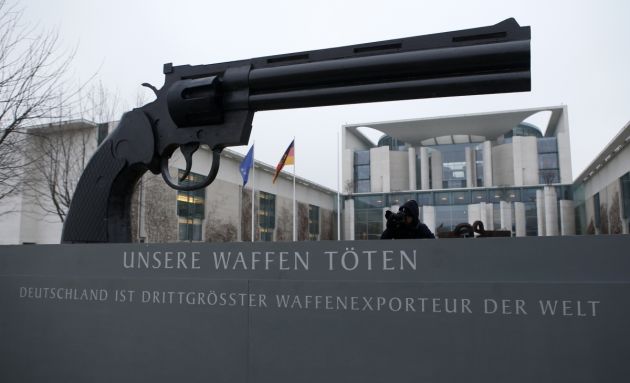International gun regulation debate gets louder around UN

International negotiators from almost 150 countries have spent this week in New York trying to hammer out a binding U.N. arms treaty by March 28.
U.S. support of the treaty remains conditional as varying factions vie for input.
"The United Nations Security Council arms embargoes are always flouted and circumvented and violated because the system of state regulation around the world is not strict enough," said Brian Wood, Amnesty International's Head of Arms Control and Human Rights.
He also noted, "There are no common rules. Why?
"Because there is no arms trade treaty."
Arms control advocates say one person is killed worldwide every minute due to armed violence and that the treaty is needed to curb the carnage.
Much of the mayhem in the world is caused by small arms and light weapons and the easy availability of ammunition.
U.N. arms embargoes in the past have proved ineffective at stopping trafficking, including in nations like Angola, Sierra Leone, Liberia and Democratic Republic of the Congo. Some of the embargo failures fell in the even darker shadow of genocide, such as in the Balkans, Darfur, Somalia and Rwanda.
Yet, despite these tragedies, the United States remains cautious in its support of a binding agreement.
"[Washington is] steadfast in its commitment to achieve a strong and effective Arms Trade Treaty that helps address the adverse effects of the international arms on global peace and stability," U.S. Secretary of State John Kerry said on March 15.
The U.S. was one of the three nations, joined by fellow Security Council members China and Russia, to end a drafting negotiation in July 2012 by asking for more time.
After the 2012 American presidential election, the U.S. Administration has appeared more open to the treaty when the U.N. General Assembly voted in December to restart talks this week.
Still the National Rifle Association in the United States has grown increasingly resistant, as treaty negotiations have neared.
"What we really object to is the inclusion of civilian firearms within the scope of the [Arms Trade Treaty]," said Tom Mason, NRA Executive Secretary and a lawyer representing NRA interests at the U.N. "This is a treaty that really needs to address the transfer of large numbers of military weapons that leads to human rights abuses. We have submitted language that you can define what a civilian firearm is."
Amnesty has fired back at the NRA's reservations for the treaty.
"The NRA claim that there is such a thing as 'civilian weapons' and that these can and need to be treated differently from military weapons under the Arms Trade Treaty is - to put it politely - the gun lobby's creativity on full display," Michelle A. Ringuette, who heads campaigns and programs at Amnesty International USA, said in a statement.
Ringuette asserted that to make such a distinction could "create a loophole that would render the treaty inoperative, as anyone could claim that he or she was in the business of trading 'civilian weapons.'"
The World Council of Churches has examined the impact of loose arms embargoes throughout the world, including in Africa.
In November, the WCC organized a meeting on the impact of small arms and light weapons in Africa's sub-regions.
The WCC's Commission of the Churches on International Affairs found that more than 60 percent of deaths in western Africa's battle-related conflicts were caused by small arms. This includes the NRA's definition of handguns as "civilian weapons."
Semegnish Asfaw, the WCC's coordinator for Accompanying Churches in Situations of Conflict, said, "As small arms are light, accessible and easy to use, child soldiering has become a major problem in various conflicts in Africa."
While presenting the consultation advice for ecumenical responses, Rev. Shirley DeWolf said that the ecumenical movement must dedicate itself for the advocacy of limiting combat with small arms in Africa.
The U.N. Arms Trade Treaty seeks to set standards for all cross-border transfers of conventional weapons, light and heavy.
It would also require all nations within the U.N. to review arms contracts to ensure that no embargo is violated nor munitions will be used in areas of human rights violations.
If approved, the treaty would go to all national parliaments, including the U.S. Congress, for ratification.
Currently, the administration in the U.S. opposes the inclusion of imports and exports of ammunition in the treaty.